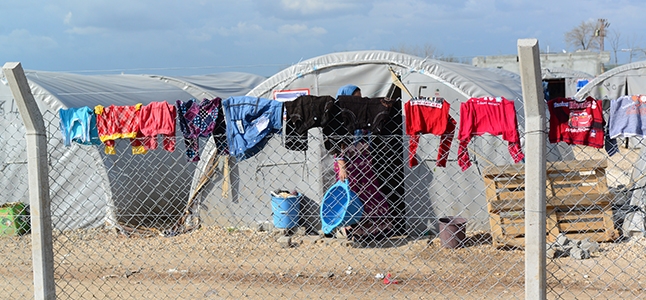The war in Syria has forced millions of Syrians to flee their country. They are particularly vulnerable and live under difficult circumstances in their host countries. Access to justice, especially to formal institutions, is particularly challenging due to missing residence permits and critical documentation. Most refugees rely on themselves and their (often small) social network to seek information and resolve their problems. The biggest barrier which prevents many from engaging in dispute resolution is that the refugees do not believe that they will succeed or achieve a positive result.
The latest Justice Needs and Satisfaction report from HiiL contains key information about the justice needs of Syrian refugees. Based on face to face interviews with 1800 refugees in Lebanon and Jordan, it explores their road to solving their most pressing justice problems. The study is part of a strategic partnership with the Dutch Ministry of Foreign Affairs.
In Lebanon, 65% of all Syrian refugees experience one or more legal problems every four years. In Jordan, 38% do so. Syrian refugees mostly experience problems which ensure their survival: non-payment of wages, termination of employment, eviction from housing, or disagreements about rent. Sadly, Syrian refugees also encounter violence frequently: among neighbours, against their children, and in the form of violent crimes by strangers. Experiencing these types of conflicts have severe effects on the refugees’ lives, frequently causing problems with relationships, loss of income, loss of time and stress-related illnesses.
Justice system in post-conflict Syria:
The report also provides insights into how many Syrian refugees want to return to Syria, what they expect their most urgent justice needs to be, and what kind of compensation the government should provide for them. It is still unclear how justice will work in post-conflict Syria, and the more information we can collect about what types of needs the Syrians will have, the better. HiiL’s report estimates that a total of 2 million housing disputes and 800,000 ID conflicts will occur once more than 4.5 million Syrians return to their country. Dealing with this number of justice problems would be a challenge for any country, but even more so for a country destroyed by war, with much of its infrastructure ruined and highly fragmented society. However, the situation also offers an opportunity for improvement. Syria can significantly improve its system by investing in innovations that deliver inclusive, effective and accessible justice mechanisms.
The way forward
More data is needed, especially on the Syrians that are displaced within the country: what particular problems do they face, which dispute resolution mechanisms are available for them and how could they be improved. It is important to recognise that whilst collecting such data is difficult, it is not impossible. Adopting SMS-based data collection, chat bots among Facebook users or monitoring social media are promising options. HiiL is currently taking steps to collect more data and will be able to share it later in the year. Rebuilding Justice in Syria is a great challenge, but also a great opportunity to organise mechanisms around the needs of the people and the communities. Access to justice is a problem that Syrians face today, but it does not have to be in the future.
Download the report here


